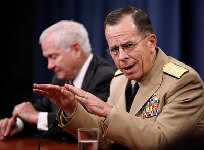
Joint Chiefs Chairman Adm. Michael Mullen, right, accompanied by Defense Secretary Robert Gates, gestures during a news conference at the Pentagon, Thursday, June 18, 2009. [Agencies]
WASHINGTON – The US military is tracking a ship from the Democratic People's Republic of Korea (DPRK) that may be carrying illicit weapons, the first vessel monitored under tougher new United Nations rules meant to rein in and punish the country following a nuclear test, officials said Thursday.
|
 Joint Chiefs Chairman Adm. Michael Mullen, right, accompanied by Defense Secretary Robert Gates, gestures during a news conference at the Pentagon, Thursday, June 18, 2009. [Agencies] |
Defense Secretary Robert Gates said he has ordered additional protections for Hawaii just in case the DPRK launches a long-range missile over the Pacific Ocean.
The suspect ship could become a test case for interception of the DPRK's ships at sea, something?the country?has said it would consider an act of war.
Officials said the US is monitoring the voyage of the DPRK-flagged Kang Nam, which left port in the?DPRK on Wednesday. On Thursday, it was traveling in the Pacific Ocean off the coast of China, two officials said on condition of anonymity to discuss intelligence.
The ship is among a group that is watched regularly but is the only one believed to have cargo that could potentially violate the UN resolution, the official said.
Joint Chiefs of Staff Chairman Adm. Mike Mullen did not specifically confirm that the US was monitoring the ship when he was asked about it at a Pentagon news conference Thursday.
"We intend to vigorously enforce the United Nations Security Council Resolution 1874 to include options, to include, certainly, hail and query," Mullen said. "If a vessel like this is queried and doesn't allow a permissive search," he noted, it can be directed into port.
The Security Council resolution calls on all 192 UN member states to inspect vessels on the high seas "if they have information that provides reasonable grounds to believe that the cargo" contains banned weapons or material to make them, and if approval is given by the country whose flag the ship sails under.
If the country refuses to give approval, it must direct the vessel "to an appropriate and convenient port for the required inspection by the local authorities."
The resolution does not authorize the use of force. But if a country refuses to order a vessel to a port for inspection, it would be in violation of the resolution and the country licensing the vessel would face possible sanctions by the Security Council.
Gates, speaking at the same news conference, said the Pentagon is concerned about the possibility of a?DPRK missile launch "in the direction of Hawaii."
Gates told reporters at the Pentagon he has sent the military's ground-based mobile missile system to Hawaii, and positioned a radar system nearby. The Terminal High Altitude Area Defense system is designed to shoot down ballistic missiles in their last stage of flight.
"We are in a good position, should it become necessary, to protect Americans and American territory," Gates said.
A Japanese newspaper reported Thursday that the DPRK might fire its most advanced ballistic missile toward Hawaii around the Fourth of July holiday.
A new missile launch — though not expected to reach US territory — would be a brazen slap in the face of the international community, which punished the DPRK with new UN sanctions for conducting a second nuclear test on May 25 in defiance of a UN ban.
The DPRK?spurned the UN Security Council resolution with threats of war and pledges to expand its nuclear bomb-making program.
The missile now being readied in the?DPRK is believed to be a Taepodong-2 with a range of up to 4,000 miles and would be launched from DPRK's Dongchang-ni site on the northwestern coast, the Yomiuri newspaper said. It cited an analysis by Japan's Defense Ministry and intelligence gathered by US reconnaissance satellites.